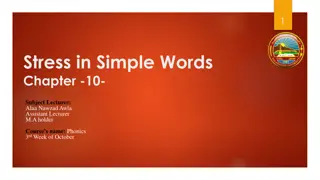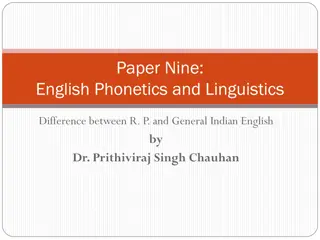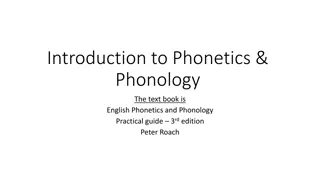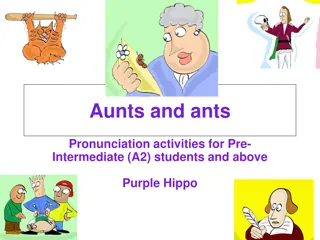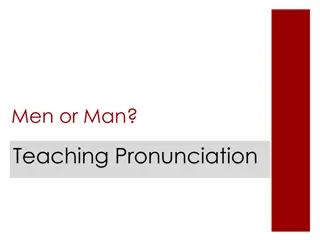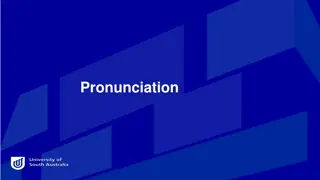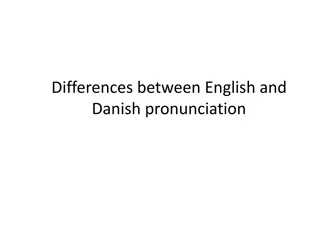Common Pronunciation Challenges in Spanish for English Speakers
Pronunciation challenges for English speakers learning Spanish include the addition of schwa sound, substitution of Spanish letters, confusion between /i/ and /ɪ/, omitting vowels before consonants, and issues with pronouncing /m/, /n/, and /r/. These challenges can affect the intelligibility and fluency of speech.
Download Presentation

Please find below an Image/Link to download the presentation.
The content on the website is provided AS IS for your information and personal use only. It may not be sold, licensed, or shared on other websites without obtaining consent from the author.If you encounter any issues during the download, it is possible that the publisher has removed the file from their server.
You are allowed to download the files provided on this website for personal or commercial use, subject to the condition that they are used lawfully. All files are the property of their respective owners.
The content on the website is provided AS IS for your information and personal use only. It may not be sold, licensed, or shared on other websites without obtaining consent from the author.
E N D
Presentation Transcript
SPANISH ENGLISH TEREZA NO I KOV
Adding // or epenthetic vowel SCHWA SOUND BEFORE WORDS BEGINNING WITH /S/ + ANOTHER CONSONANT -> DEFORMATION OF RHYTHM AND INTONATION STOP; SPEAK; SNEAK
Substitution SPANISH LETTERS ARE WRITTEN AS PRONOUNCED BAD INTELLIGIBILITY The schwa sound / / Responsib( )le; Personality; Vegetab( )les; stationary etc. The vowel / / for /a/ or / / or /e/ substitute vowel / / for /a/ or / / Have; Cat; Fat; Rat; plaid; apple; advertising
Confusion of /i/ and // when they see the letter [i] /i/: Need; read; treat; believe; meat; wheel / /: Knit; rid; tit; live; mitt; will / / Tendency to shorten vowels / / replaced with / / or / / Robot; caught; call; mall /u:/ and / / /u:/: Room; tooth; food / /: Book; put; foot; hood;
/o/ Learners have to pronounce a vowel / / and a consonant /w/ -> Spanish learners leave the vowel out Wrote; old; boat; coat /e / and /a / omitting the /j/ altogether at times or mispronounce the vowel preceding it whether it happens to be /e/ or /a/ /e /: Name; date; wait; train /a /:right; fight; side; light; tried / / & / / Palatalization to /t/ and /d
/m/ no problem pronouncing this consonant when it s in the beginning of the word as in [miss] or [mister] but when it occurs in the end of the word -> /n/ Dream; rhyme; fame; William /n/ & / / Problems with /n/ in the beginning or middle of the word -> tendency to use / / instead While with ing -> tendency to use /n/ /n/ (beginning and middle): name; knight; north; listener /n/ (end): corn; thin; pen; can; listen
/r/ Spanish /r/ with sound vibration Voiced Vs. Voiceless /z/ + vowel as in [zero] which is pronounced as /si:ro / /s/ + consosnant as in [sleep], which is sometimes pronounced as /zli:p/ the final [s] in the word as in [please] big problem not only /s/, it also affects /f/ and /v/, /k/ and /g/, /t/ and /d/, /t / and / /, / / and / /, /p/ and /p/ and finally / / and / /
Voiced and Voiceless /z/: zero; please; is; rise; hazard; hazel;he s ill etc./f/ and /v/: five and fife /k/ and /g/: log and lock/t/ and /d/: kid and kit /t / and / / (especially at word endings): bridge and breach / / and / /: usually and ushully /p/ and /p/: Bob and bop / / and / /: with and width
/j/ & // Word starting with /j/ becomes / / and sometimes /dj/ Words starting with / / becomes /j/ /j/: yes; yell; yet; you; University / /: John; germs; job;gel; jewelry /w/ when it precedes vowel / / as in [would] -> tendency to insert /g/ before /w/ which makes [would] sound like [good] /w/: would; wood; wool; wolf; womb /v/ when producing /v/, the result is /b/ /v/: over; oval; rove; novel; hover; drove but alsoProve; move
SOURCES http://englishspeaklikenative.com/resources/common- pronunciation-problems/spanish-pronunciation-problems/ http://edition.tefl.net/articles/teacher-technique/spanish-speaker- pronunciation-problems/ https://www.youtube.com/watch?v=zCgDSNkzjEg



